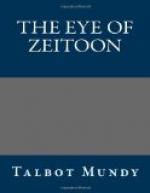We found a khan at last on the outskirts of the city, almost in sight of the railway line, that well agreed with our frame of mind. It was none of the newfangled, underdone affairs that ape hotels, with Greek managers and as many different prices for one service as there are grades of credulity, but a genuine two-hundred-year-old Turkish place, run by a Turk, and named Yeni Khan (which means the new rest house) in proof that once the world was younger. The man who directed us to the place called it a kahveh; but that means a place for donkeys and foot-passengers, and when we spoke of it as kahveh to the obadashi— the elderly youth who corresponds to porter, bell-boy and chambermaid in one—he was visibly annoyed.
Truly the place was a khan—a great bleak building of four high outer walls, surrounding a courtyard that was a yard deep with the dung of countless camels, horses, bullocks, asses; crowded with arabas, the four-wheeled vehicles of all the Near East, and smelly with centuries of human journeys’ ends.
Khans provide nothing except room, heat and water (and the heat costs extra); there is no sanitation for any one at any price; every guest dumps all his discarded rubbish over the balcony rail into the courtyard, to be trodden and wheeled under foot and help build the aroma. But the guests provide a picture without price that with the very first glimpse drives discomfort out of mind.
In that place there were Parthians, Medes and Elamites, and all the rest of the list. There was even a Chinaman. Two Hindus were unpacking bundles out of a creaking araba, watched scornfully by an unmistakable Pathan. A fat swarthy-faced Greek in black frock coat and trousers, fez, and slippered feet gesticulated with his right arm like a pump-handle while he sat on the balcony-rail and bellowed orders to a crowd mixed of Armenians, Italians, Maltese, Syrians and a Turk or two, who labored with his bales of cotton goods below. (The Italians eyed everybody sidewise, for there were rumors in those days of impending trouble, and when the Turk begins hostilities he likes his first opponents easy and ready to hand.)
There were Kurds, long-nosed, lean-lipped and suspicious, who said very little, but hugged long knives as they passed back and forth among the swarming strangers. They said nothing at all, those Kurds, but listened a very great deal.
Tall, mustached Circassians, with eighteen-inch Erzerum daggers at their waists, swaggered about as if they, and only they, were history’s heirs. It was expedient to get out of their path alertly, but they cringed into second place before the Turks, who, without any swagger at all, lorded it over every one. For the Turk is a conqueror, whatever else he ought to be. The poorest Turkish servant is race-conscious, and unshakably convinced of his own superiority to the princes of the conquered. One has to bear that fact in mind when dealing with the Turk; it colors all his views of life, and accounts for some of his famous unexpectedness.




